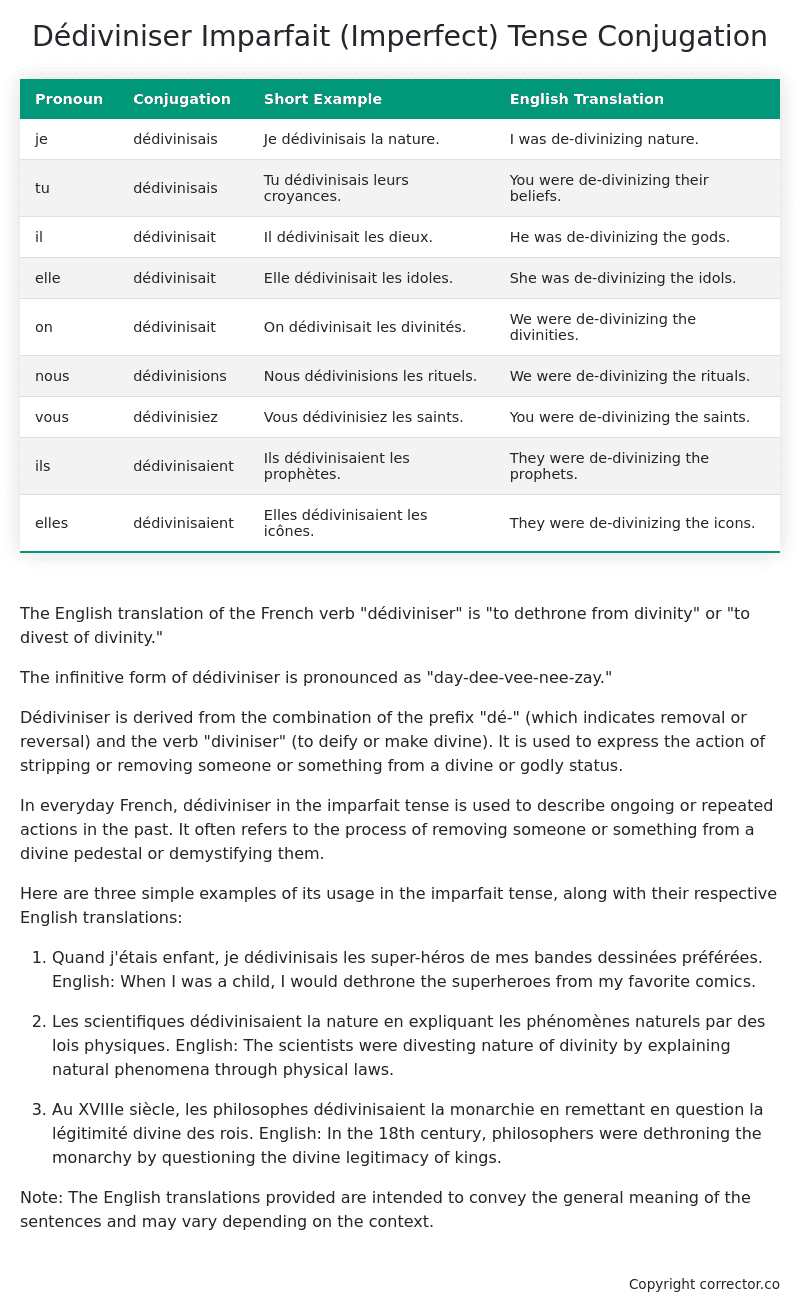Imparfait (Imperfect) Tense Conjugation of the French Verb dédiviniser
Introduction to the verb dédiviniser
The English translation of the French verb “dédiviniser” is “to dethrone from divinity” or “to divest of divinity.”
The infinitive form of dédiviniser is pronounced as “day-dee-vee-nee-zay.”
Dédiviniser is derived from the combination of the prefix “dé-” (which indicates removal or reversal) and the verb “diviniser” (to deify or make divine). It is used to express the action of stripping or removing someone or something from a divine or godly status.
In everyday French, dédiviniser in the imparfait tense is used to describe ongoing or repeated actions in the past. It often refers to the process of removing someone or something from a divine pedestal or demystifying them.
Here are three simple examples of its usage in the imparfait tense, along with their respective English translations:
-
Quand j’étais enfant, je dédivinisais les super-héros de mes bandes dessinées préférées.
English: When I was a child, I would dethrone the superheroes from my favorite comics. -
Les scientifiques dédivinisaient la nature en expliquant les phénomènes naturels par des lois physiques.
English: The scientists were divesting nature of divinity by explaining natural phenomena through physical laws. -
Au XVIIIe siècle, les philosophes dédivinisaient la monarchie en remettant en question la légitimité divine des rois.
English: In the 18th century, philosophers were dethroning the monarchy by questioning the divine legitimacy of kings.
Note: The English translations provided are intended to convey the general meaning of the sentences and may vary depending on the context.
Table of the Imparfait (Imperfect) Tense Conjugation of dédiviniser
| Pronoun | Conjugation | Short Example | English Translation |
|---|---|---|---|
| je | dédivinisais | Je dédivinisais la nature. | I was de-divinizing nature. |
| tu | dédivinisais | Tu dédivinisais leurs croyances. | You were de-divinizing their beliefs. |
| il | dédivinisait | Il dédivinisait les dieux. | He was de-divinizing the gods. |
| elle | dédivinisait | Elle dédivinisait les idoles. | She was de-divinizing the idols. |
| on | dédivinisait | On dédivinisait les divinités. | We were de-divinizing the divinities. |
| nous | dédivinisions | Nous dédivinisions les rituels. | We were de-divinizing the rituals. |
| vous | dédivinisiez | Vous dédivinisiez les saints. | You were de-divinizing the saints. |
| ils | dédivinisaient | Ils dédivinisaient les prophètes. | They were de-divinizing the prophets. |
| elles | dédivinisaient | Elles dédivinisaient les icônes. | They were de-divinizing the icons. |
Other Conjugations for Dédiviniser.
Le Present (Present Tense) Conjugation of the French Verb dédiviniser
Imparfait (Imperfect) Tense Conjugation of the French Verb dédiviniser (You’re reading it right now!)
Passé Simple (Simple Past) Tense Conjugation of the French Verb dédiviniser
Passé Composé (Present Perfect) Tense Conjugation of the French Verb dédiviniser
Futur Simple (Simple Future) Tense Conjugation of the French Verb dédiviniser
Futur Proche (Near Future) Tense Conjugation of the French Verb dédiviniser
Plus-que-parfait (Pluperfect) Tense Conjugation of the French Verb dédiviniser
Passé Antérieur (Past Anterior) Tense Conjugation of the French Verb dédiviniser
Futur Antérieur (Future Anterior) Tense Conjugation of the French Verb dédiviniser
Subjonctif Présent (Subjunctive Present) Tense Conjugation of the French Verb dédiviniser
Subjonctif Passé (Subjunctive Past) Tense Conjugation of the French Verb dédiviniser
Subjonctif Imparfait (Subjunctive Imperfect) Tense Conjugation of the French Verb dédiviniser
Conditionnel Présent (Conditional Present) Tense Conjugation of the French Verb dédiviniser
Conditionnel Passé (Conditional Past) Tense Conjugation of the French Verb dédiviniser
Conditionnel Passé II (Conditional Past II) Tense Conjugation of the French Verb dédiviniser
L’impératif Présent (Imperative Present) Tense Conjugation of the French Verb dédiviniser
L’impératif Passé (Imperative Past) Tense Conjugation of the French Verb dédiviniser
L’infinitif Présent (Infinitive Present) Tense Conjugation of the French Verb dédiviniser
L’infinitif Passé (Infinitive Past) Tense Conjugation of the French Verb dédiviniser
Le Participe Présent (Present Participle) Tense Conjugation of the French Verb dédiviniser
Le Participe Passé (Past Participle) Tense Conjugation of the French Verb dédiviniser
Struggling with French verbs or the language in general? Why not use our free French Grammar Checker – no registration required!
Get a FREE Download Study Sheet of this Conjugation 🔥
Simply right click the image below, click “save image” and get your free reference for the dédiviniser imparfait tense conjugation!

Dédiviniser – About the French Imparfait Tense
NOTE: To take a deep dive into all the French tenses then see our article on Mastering French Tense Conjugation.
Formation of the Imparfait Tense
For regular -er verbs:
For regular -ir verbs
For regular -re verbs
Common Everyday Usage Patterns
Description of Past Habits
Background Information
Mental and Emotional States
It’s employed to express emotions, thoughts, or physical sensations in the past. For example: “J’étais content quand il est arrivé.” (I was happy when he arrived.)
Ongoing Actions
Points to Note About the Imparfait Tense
Passé Composé vs. Imparfait
Conditional
Si Clauses
Narration
I hope you enjoyed this article on the verb dédiviniser. Still in a learning mood? Check out another TOTALLY random French verb imparfait conjugation!


